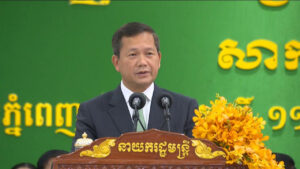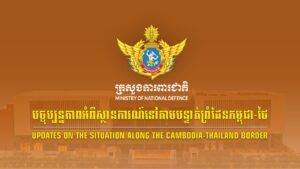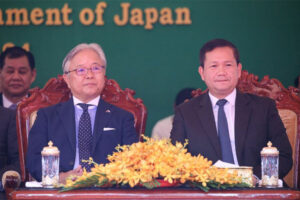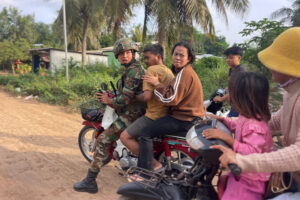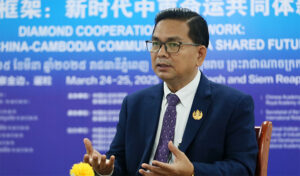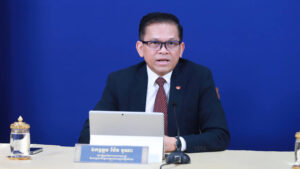Selected Comments Samdech Techo Hun Sen, President of the Senate, at the opening ceremony of the first Senate Session for the fifth legislature [Unofficial translations]
![Selected Comments Samdech Techo Hun Sen, President of the Senate, at the opening ceremony of the first Senate Session for the fifth legislature [Unofficial translations]](https://grandnewsasia.com/app/uploads/2024/04/photo_2024-04-03_13-36-19-2.jpg) Selected Comments Samdech Techo Hun Sen, President of the Senate, at the opening ceremony of the first Senate Session for the fifth legislature [Unofficial translations]
Selected Comments Samdech Techo Hun Sen, President of the Senate, at the opening ceremony of the first Senate Session for the fifth legislature [Unofficial translations]
[1]
[…] Before giving the speech, (let me ask all senators) to protect their health until we reach the end of this term of legislature, which is in 2030. Let us strive to protect health to be able to work together until 2030. I will be 78 years old by then. It is a coincidence that today, 54 years ago, I was getting myself ready to sneak into the Marquis responding to the call of Prince Norodom Sihanouk, Preah Borom Ratanak Kaod. I was 32 years old when I became Prime Minister. Today, at the age of 72, I become the President of the Senate […] coincidentally, they all end in number 2 […]
[2]
I would like to take this rare opportunity to remind you a little, and hope that Samdech, His Excellency, Lok Chumteav, will not get tired of hearing about the history of the establishment of the Senate. If we talk about this Senate, we must first remember the great grace of His Majesty the King Father, who at the time led the resolution of the post-election crisis. Although the election was hailed as a “miracle along the Mekong”, dissent from some political parties led to a serious post-election crisis.
Probably all of you, or at least some of you, still remember the assassination attempt on me on September 24, 1998 in Siem Reap. At that time, organizing meeting in Phnom Penh was not possible. Although it was agreed that the first session of the National Assembly should be held at the Royal Palace (in Phnom Penh) and I would send two helicopters for His Majesty from Siem Reap for the meeting, which was not to be taking place in the National Assembly.
Later, His Majesty decided to convene the National Assembly first session in Siem Reap. I consider the (unsuccessful) assassination attempt a good luck for the nation or my own good fortune. This story is not small. If I died then, Siem Reap would become a killing field. Pools of blood would appear all over Siem Reap. Even though I was not in danger, some commanders demanded an attack. Four rockets planted but only exploded. This was a tragic event. Despites all that, we could still convene the National Assembly session, after which, we went on to a swearing-in ceremony at Angkor Wat.
After the National Assembly session, the Royal Government was not able to take form. At that time, those sworn-in members of the National Assembly (MNAs) had immunity. After this incident that someone threw a grenade at my house in Phnom Penh, and the demonstrators camping in front of the National Assembly, I issued an order forbidding anyone from leaving Phnom Penh for foreign countries. His Excellency Tol Loh, during the talks in Siem Reap, said to me, “Samdech, banning MNAs from leaving the country is against immunity.” I told His Excellency Tol Loh, “Have you all become MNAs yet? since the National Assembly has not yet sworn in? You do not have immunity yet, Excellency.”
After the meeting, a number of deputies left the country. In this regard, the political stalemate continued. During that stalemate, one may ask where the idea of having the Senate come from? I should thank the soul of Samdech Vibol Panha Sok An, for thinking and brining up this idea. His Excellency Prak Sokhon also knew and raised this idea with me. I went to discuss with Samdech Chea Sim. Then there was the CPP Standing Committee meeting (which decided) that the only way for power sharing in this two-thirds majority system of elections is the creation of the Senate.
We sent this message to FUNCINPEC, led by Samdech Krom Preah (Norodom Ranaridh). (The late) His Majesty (Norodom Sihanouk) convened a meeting. Samdech Krom Preah requested security for himself. I have assured him that I am responsible for his security, which was very necessary since FUNCINPEC at that time had split into a multi-functional FUNCINPEC. Therefore, it was not possible to leave Samdech Krom Preah in danger. However, a political party leader asked me to also provide him security. I told him that he might go wherever he wanted. That he left on his own consent, why there needed to be my guarantee of security for him to return?
At that time, we had three (political) parties. I do not need to name them […] I used the straightforward term, “Wherever it may take, just you go.” This is true. Let’s re-open the Friday-13 November agreement, which, according to the Europeans, is not a good date, but for us Cambodians, it turned out to be good. The meeting (was held) in the Royal Palace’s Temple of Khemarin. On the CPP side, there were Samdech Chea Sim, myself, Samdech Vibol Panha Sok An, and HE Prak Sokhon was then an assistant. On the FUNCINPEC side, there were Samdech Krom Preah, His Excellency You Hockri, and assistants such as His Excellency Kong Vibol and some others.
At that time, we laid down the CPP proposed-initiative for the establishment of a Senate, which originated from resolving political crises, but also was in conformity with the pattern of many countries where there are two levels of parliaments. At this point, an arrow can shoot a number of birds, including the end of the political stalemate. At that time, during the first term, Samdech Chea Sim was the President of the National Assembly. Samdech Krom Preah and I were the first and second Prime Ministers. How did we go about dividing power? The division of power was Samdech Chea Sim became the President of the Senate, Samdech Krom Preah became the President of the National Assembly, and I became the Prime Minister. We no longer have a Co-Prime Minister.
His Majesty the King Father clearly stated, “I am the King, the first person, Samdech Chea Sim is the second person, Samdech Krom Preah is the third person, and Samdech Hun Sen is the fourth person.” He further stated, “the first, the second, and the third have no power. Power is with the fourth person, Samdech Hun Sen.” So, that was the story. In a parliamentary regime, power rests with the prime minister. On the protocol part, HM the King is the first person, the President of the Senate is the second person, the President of the National Assembly is the third person, and the Prime Minister is the fourth person. The fourth person is the one with ruling power.
This is a reminder of issues related to initiatives to break deadlocks. Without the role of His Majesty the King Father, then there would have been a long crisis leading to bloodshed while the Khmer Rouge had not yet left the jungle. That is why it was not until the end of November that we formed the Royal Government for the second term and on December 2, 1998, at the first meeting of the Council of Ministers for the second legislative term, I set out a triangular strategy. This is a reminder so that we can see where the Senate came from and how it was initiated.
The co-founders of this whole story, in terms of the characters for the negotiations, I am the only one left alive. I thank the soul of HM the late King Father of the Nation for breaking the deadlock, and the respective political parties for respecting (HM the King Father’s guidance) leading, in 1999, to (the Senate establishment) defined in the Constitutional provisions (to have) half of the seats (in the National Assembly). It all started from the three political parties to first appoint the senators, and later we voted […]./.

